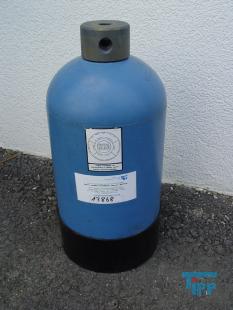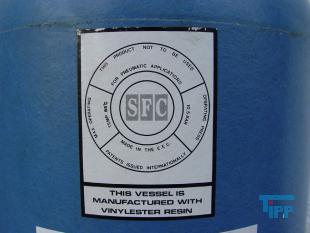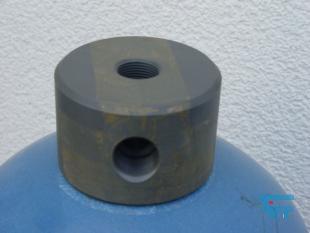used glas fiber pressure tank
details to article: 13868
| Producer: | SFC |
| Pieces: | 1 |
| Condition: | gebraucht / used / second hand |
Alle Angaben, Bilder, Hinweise und Empfehlungen erfolgen nach bestem Wissen, je- doch ohne Gewähr. Änderungen der technischen Angaben bleiben vorbehalten.
informations about: pressing reservoirs, pressure tanks, pressure vessels A pressure vessel is a closed container designed to hold gases or liquids at a pressure substantially different from the ambient pressure. Theoretically, a spherical pressure vessel has approximately twice the strength of a cylindrical pressure vessel. However, a spherical shape is difficult to manufacture, and therefore more expensive, so most pressure vessels are cylindrical with 2:1 semi-elliptical heads or end caps on each end. Smaller pressure vessels are assembled from a pipe and two covers. A disadvantage of these vessels is that greater breadths are more expensive, so that for example the most economic shape of a 1,000 litres (35 cu ft), 250 bars (3,600 psi) pressure vessel might be a breadth of 914.4 millimetres (36 in) and a width of 1,701.8 millimetres (67 in) including the 2:1 semi-elliptical domed end caps. Construction materials Steel Pressure Vessel Theoretically almost any material with good tensile properties that is chemically stable in the chosen application could be employed. However, pressure vessel design codes and application standards (ASME BPVC Section II, EN 13445-2 etc.) contain long lists of approved materials with associated limitations in temperature range. Many pressure vessels are made of steel. To manufacture a cylindrical or spherical pressure vessel, rolled and possibly forged parts would have to be welded together. Some mechanical properties of steel, achieved by rolling or forging, could be adversely affected by welding, unless special precautions are taken. In addition to adequate mechanical strength, current standards dictate the use of steel with a high impact resistance, especially for vessels used in low temperatures. In applications where carbon steel would suffer corrosion, special corrosion resistant material should also be used. The pressure differential is dangerous and many fatal accidents have occurred in the history of their development and operation. Consequently, their design, manufacture, and operation are regulated by engineering authorities backed by legislation. For these reasons, the definition of a pressure vessel varies from country to country, but involves parameters such as maximum safe operating pressure and temperature. A pressure vessel is a closed container designed to hold gases or liquids at a pressure substantially different from the ambient pressure. The pressure differential is dangerous and many fatal accidents have occurred in the history of their development and operation. Consequently, their design, manufacture, and operation are regulated by engineering authorities backed by legislation. For these reasons, the definition of a pressure vessel varies from country to country, but involves parameters such as maximum safe operating pressure and temperature. Pressure vessel features Shape of a pressure vessel Pressure vessels can theoretically be almost any shape, but shapes made of sections of spheres, cylinders, and cones are usually employed. A common design is a cylinder with end caps called heads. Head shapes are frequently either hemispherical or dished (torispherical). More complicated shapes have historically been much harder to analyze for safe operation and are usually far more difficult to construct. From Wikipedia, the free encyclopedia | |||||||||||||||||||||||||||||||||||||
| email: mail@tipp-international.de | |||||||||||||||||||||||||||||||||||||
| Internet: www.tipp-international.de | |||||||||||||||||||||||||||||||||||||







